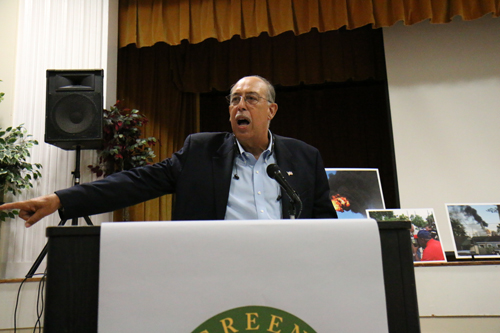
Retired Gen. Russell Honore speaks at the GreenARMY Katrina commemoration at Xavier University. (Zach Brien for UptownMessenger.com)
As New Orleans continues to recover from the devastation that followed Hurricane Katrina nine years ago, the city should pass a law preventing any schools or daycare centers from being built on top of toxic soil — including the proposed rebuilding of the Booker T. Washington High School over the old Silver City dump site in Central City, retired Lt. Gen. Russell Honore and local allies said Saturday morning.
“We’re the oldest city in this part of the country, and we ought to be the first to make a stand,” Honore said. “We’re not going to put a school on a dump.”
Honore’s famously barked orders of “weapons down!” after his assignment to New Orleans in the days after the levees broke symbolized a turning point for the city. Since his retirement from the army, however, Honore has turned his attention to environmental-justice issues around his home state of Louisiana, and he offered updates on those efforts Saturday morning at the GreenARMY Katrina commemoration breakfast.
One of the issues he has taken a stand against is the proposed rebuilding of the Booker T. Washington High School, which was originally built decades ago on top of the former Silver City waste dump. The soil at the Central City site still contains dangerous levels of arsenic, lead and other heavy metals, but Recovery School District officials have said they can make it safe by removing the top layer of soil.
“The recovery of New Orleans is a great thing the last nine years. But what it has also uncovered is that we know now what we didn’t know 50 years ago,” Honore said Saturday morning. “We did some construction in this city 50 years ago on ground that was questionable. We have the ability to test now and know there’s lead and arsenic in some of this ground because they were previous dumps. We cannot continue to build on those places unless we go through complete remediation of that ground.”
The Rev. Moses Gordon of Fellowship Missionary Baptist Church is a third-generation alumnus of Walter L. Cohen High School, which is scheduled to be given the Booker T. Washington campus. Years ago, Cohen was a “bastion of pride, hope and higher learning,” but alumni question the Recovery School District’s intentions with moving the school, Gordon said.
“Who chose this site, this lowland of toxicity, this poisonous territory that will contribute to the future skulls and bones of our children?” Gordon asked. “Why would you build a school where you shouldn’t build a house? Why build a place of learning on land that is not fit for living?”
The potential illnesses caused by the heavy metals will work contrary to any effort to educate the children there, Gordon said.
“Will there be reading, writing and arithmetic, or reading, writing and arsenic?” Gordon asked. “If it’s going to be reading, writing and arsenic, our children will not need to identify and properly spell words or learn how to calculate or construct sentences that are grammatically correct, because the arsenic, the zinc, the cadmium, the lead, the copper and the barium will short-circuit their productivity, and they will live limping lives of unfulfilled possibilities.”
Legal challenges filed by attorney Monique Harden have halted the construction for now. Gordon issued two calls for action: first, that voters hold elected officials accountable for allowing such decisions, and second, that the city of New Orleans pass a law prohibiting construction of facilities for children like schools and day cares on top of contaminated sites.
“No city should approve building permits that put our children in harm’s way,” Gordon said.
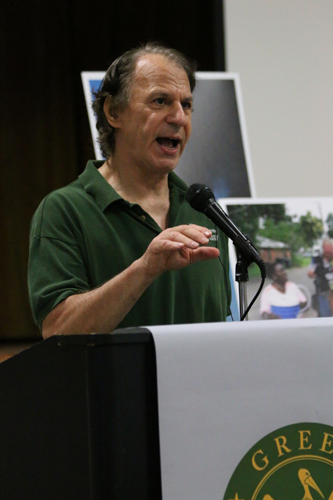
Author and activist John Barry speaks at the GreenARMY Katrina commemoration at Xavier University. (Zach Brien for UptownMessenger.com)
Only one elected official spoke at Saturday’s ceremony, District C City Councilwoman Nadine Ramsey, who noted that in her earlier career as judge she had presided over a similar case of a school being built on a landfill. She promised to ask “hard questions” of the Recovery School District about the Booker T. Washington school site when it comes before the City Council, but she has also been chastised by a Booker T. Washington alumnus for opposing the rebuilding.
“There are two sides to the argument,” Ramsey said. “Believe it or not, there are people out there with opposing views, and we’re going to have listen.”
Saturday’s event included discussion of a number of other issues, including the proposed re-routing of trains from Old Metairie through Hollygrove and Mid-City, the air pollution in nearby St. Rose, and efforts to hold oil companies accountable for their contributions to decades of coastal wetlands loss. Rising Tide author John Barry — who was ousted from his leadership post with the flood authority after it sued the oil and gas companies over destruction of Louisiana’s wetlands — described all of the efforts so far as steps toward changing the history of the state.
“I’m a historian professionally. I can tell you that history doesn’t just happen. People make history,” Barry said. “The real history of this legislative session is going to be made by you in this room, going forward into the future.”
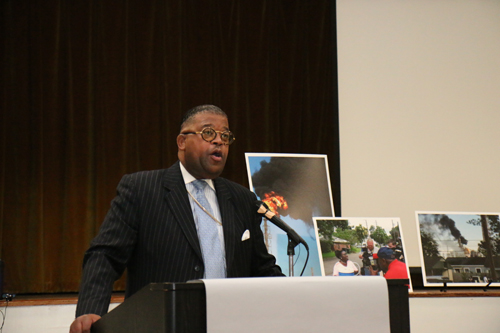
The Rev. Moses Gordon of speaks against the rebuilding of the Booker T. Washington High School atop a former waste dump at the GreenARMY Katrina commemoration at Xavier University. (Zach Brien for UptownMessenger.com)
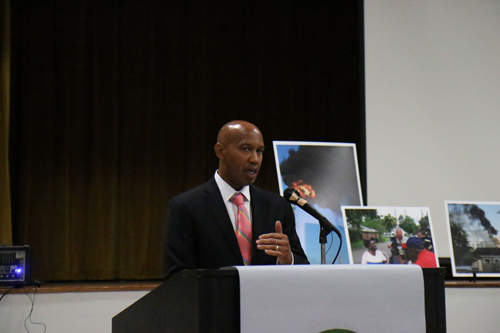
The Rev. Earl Williams speaks against a railroad through Hollygrove at the GreenARMY Katrina commemoration at Xavier University. (Zach Brien for UptownMessenger.com)
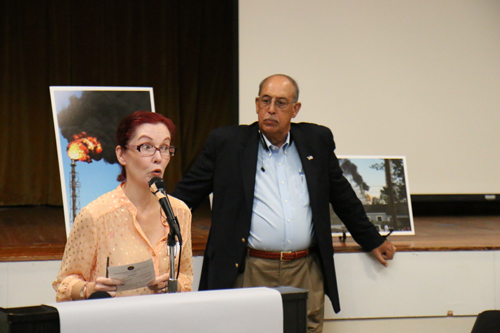
Retired Lt. Gen. Russell Honore looks on while an activist discusses fracking in St. Tammany Parish at the GreenARMY Katrina commemoration at Xavier University. (Zach Brien for UptownMessenger.com)
To watch full video of the morning’s discussions, see above, or to read our live coverage, see below.
What do environmental activists say about the notion that the land cannot be remediated? Of course, schools and virtually nothing else should be built on contaminated soils, but doesn’t that beg the question? When a piece of God’s (once) green Earth is poisoned, should it be fenced off for all time? Are the millions and billions we spend to restore the land wasted? Actually, I would avoid building a school there because the contaminants might be removed, but the controversy will be forever.